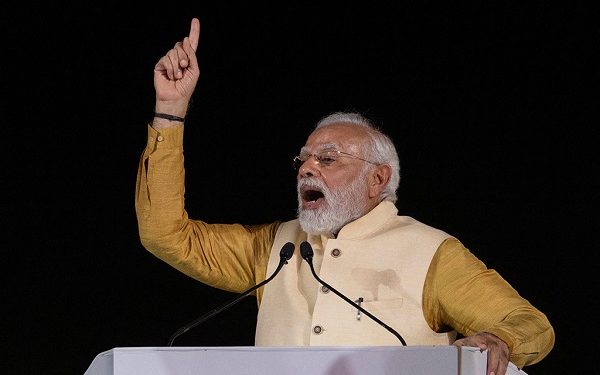The Indian government has invoked emergency laws to block a BBC documentary examining the role of the prime minister, Narendra Modi, during riots in the western state of Gujarat in 2002.
Controversy has erupted in India over the first episode of the two-part programme, India: The Modi Question, which tracked his rise through the ranks of the Bharatiya Janata party and his appointment as chief minister of Gujarat.
The documentary also uncovered memos criticizing Modi’s conduct by western diplomats and the British government, including in a government report which found that the riots had “all the hallmarks of an ethnic cleansing”.
Modi has been haunted for decades by allegations of complicity in the violence that took place during the Gujarat riots, which broke out after 59 Hindu pilgrims died on a train that had been set on fire. The fire was blamed on the state’s Muslim population.
Almost 1,000 Muslims died in violence across the state. Police were accused of standing by and Modi of not doing enough to protect the minority community from the Hindu mobs and even tacitly supporting the Hindu extremists. He has denied accusations he failed to stop the rioting and in 2013 a supreme court panel said there was insufficient evidence to prosecute him.
The first episode aired in the UK was blocked in India but its content – including unauthorised video clips – have been circulating on social media. It prompted a vehement response from the Modi government, which has described the documentary as “a propaganda piece designed to push a particular discredited narrative”.
“The bias and lack of objectivity and frankly continuing colonial mind set are blatantly visible,” said Arindam Bagchi, spokesperson for the foreign affairs ministry.
The documentary was also raised in the UK parliament, where the Labour MP Imran Hussain challenged the prime minister, Rishi Sunak, over the British government’s alleged knowledge of Modi’s role during in the violence. “I am not sure that I agree at all with the characterisation,” responded Sunak who is a Hindu.
Over the weekend, India’s ministry of information and broadcasting issued directions banning any clips from the episode being shared under legislation introduced in 2021 that allow for the “blocking of information in case of emergency”.
Kanchan Gupta, an adviser at the ministry, said the government had ordered Twitter and YouTube to take down dozens of accounts that had been sharing clips of the Modi documentary on the basis that it was “undermining the sovereignty and integrity of India” and “making unsubstantiated allegations”.
The BBC has said in a statement that its documentary was “rigorously researched according to highest editorial standards”.
The ban on the BBC documentary was met with outrage by India opposition politicians, who accused the Modi government of censorship. Mahua Moitra, an MP for opposition party Trinamool Congress, tweeted a link to a clip, writing: “Shame that the emperor and courtiers of the world’s largest democracy are so insecure. Sorry, haven’t been elected to represent world’s largest democracy to accept censorship.”
The ban has brought the authorities of a top Indian university in confrontation with the student union body of New Delhi’s Jawaharlal Nehru University, long seen as a bastion of left-wing politics, said on Twitter it would screen the documentary, “India: The Modi Question”, at a cafeteria at 9 p.m. (1530 GMT).
On its website, the university administration said it had not given permission for the showing.
“This is to emphasise that such an unauthorised activity may disturb peace and harmony of the university campus,” it added.
“The concerned students/individuals are firmly advised to cancel the proposed programme immediately, failing which a strict disciplinary action may be initiated as per the university rules.”
On Twitter, the union president, Aishe Ghosh, had asked students to attend the screening of the documentary, describing it as having been “‘banned’ by an ‘elected government’ of the largest ‘democracy'”.
Police are closely watching the situation, said a Delhi police officer monitoring the area around JNU. The documentary is also set to be screened at some campuses in the Communist-ruled southern state of Kerala.

